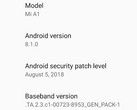You may think that only truly massive companies such as Samsung or Alphabet Inc. could institute and maintain payments services that only need a card number and your phone to work. Well, you might be wrong: all it takes is the approval for a company to use Unified Payments Interfaces (UPIs) with a bank or banking system. UPIs allow payments to circumvent other products such as card-based accounts through the use of unique identifiers for each customer.
On the other hand, it also helps if you have a sizable market share in the country in which you want to offer a UPI-based service. This may be why Xiaomi is currently applying to bring their own proprietary payments app to India. Known as Mi Pay, it is already in use in China. Xiaomi has been reportedly testing Mi Pay in its new market, and is awaiting approval from the Indian Reserve Bank to roll it out to its customers there.
India is regarded as the most rapidly-growing market in terms of both smartphone use and contactless payments uptake. Xiaomi must be confident in its own offering, as Mi Pay will have to compete with the likes of WhatsApp and PayU, as well as the two most obvious rivals. Then again, if Mi Pay succeeds in its new environment, it may also spread to Xiaomi's other emerging market, which is Western Europe. However, Xiaomi's newest release, the popular Poco F1, will be left out of this payments revolution: it lacks the NFC capabilities necessary for UPIs to function.


















